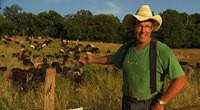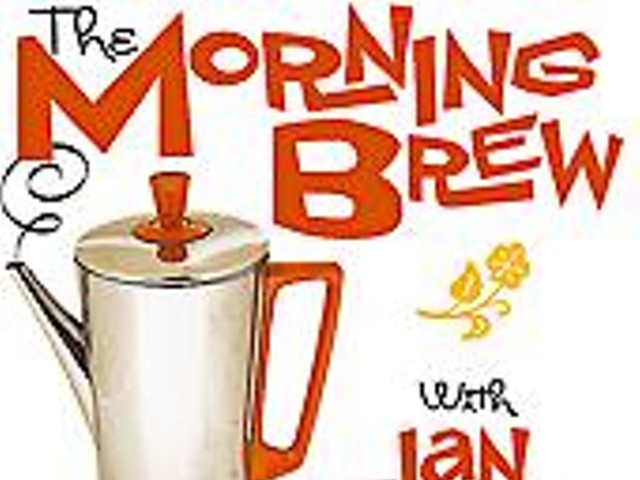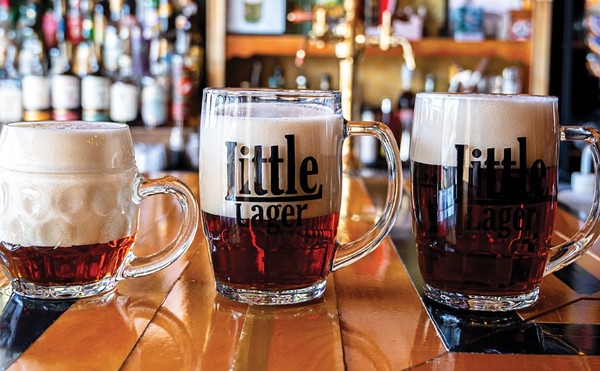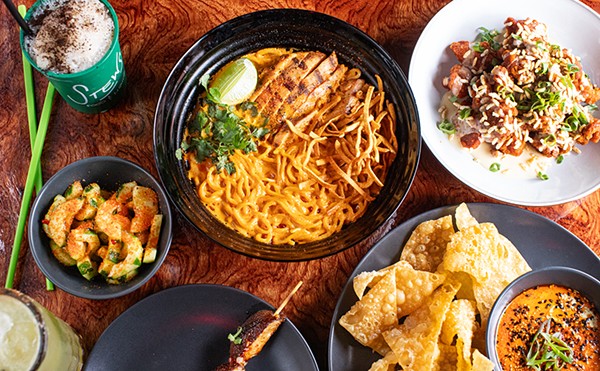The line outside the Tivoli Theatre Wednesday night was nearly as long as the line for free burritos when the Delmar Loop Chipotle opened last year, except instead of hungry students, it was comprised (or, rather, also comprised) of earnest liberals, all clutching in their sweaty hands vouchers from the Landmark Theatres Film Club inviting them to a free screening of the new documentary Food, Inc.
A man on a girl's bike rode up to the brick wall beside the parking lot, stared entranced at the crowd and breathed, "Jackpot!"
In his sweaty hands, he clutched a pile of manila folders stuffed with cardboard and held together with rubber bands. All of which mean one thing to habitues of the Loop: Petition. In this case, to preserve Missouri's secret ballot.
(To his credit, at least he did not say, "Hey, do you have a minute for the secret ballot?")
But he also didn't get very far down the line before the Tivoli flung its doors open and let the crowd into the air-conditioning.
Much has already been written about Food, Inc., even on this here blog. Michael Pollan, of The Omnivore's Dilemma fame, appears. (And, unlike at his visit to the St. Louis County Public Library, you can actually see him.) So does Eric Schlosser, who wrote Fast Food Nation and, incidentally, also co-produced this film.
Despite his prodigious research into the origins of meat, Schlosser confesses that his favorite meal is still a hamburger and fries and procedes to devour a particularly juicy speciman on camera. This alleviates some of the good liberal guilt inspired by later footage of cows in feedlots and slaughterhouses.
(It also made your correspondent, toting a bag fragrant with garlic recently purchased at the Maplewood Farmers' Market, start to thinking longingly of dinner.)
And footage of feedlots and slaughterhouses abound. Also of chicken houses -- and a chicken farmer scooping up dead chickens for burial. A subtitle reveals that the typical chicken farmer is $500,000 in debt and earns only $18,000 per year. (The audience gasps.)
As anyone who has ever seen or read an expose of the food industry could predict, the major villains of Food, Inc. are major corporations like Tyson, Perdue, Smithfield and St. Louis' very own Monsanto, all of whom, the film notes in a refrain that becomes almost Biblical, declined to be interviewed for this film.
Since the rise of fast food in the 1950s, the corporations have had to meet an enormous demand for meat, particularly meat that is uniform in size and quality. The result is that the food industry has become increasingly mechanized, and equally cruel to the animals and the workers. One major beef producer proudly describes himself as an "engineer".
Food, Inc. has some heartbreaking stories. Barbara Kowalczyk became an advocate for food safety after her three-year-old son Kevin died of E. coli contracted from a bad hamburger. Moe Parr was hounded by Monsanto, who eventually sued him for seed-cleaning, or preparing seeds for another growing season. (Monsanto essentially controls the entire seed industry.)
The movie's populist hero is farmer Joel Salatin, who also appears in The Omnivore's Dilemma. Salatin's small farm, the "beyond organic" Polyface, Inc., is presented as the agrarian ideal. Even scenes of chicken-slaughter are filmed in golden light. Salatin also received the biggest round of applause pre-credits for declaring that any nation that treats its animals and factory workers the way the Americans do is bound to be a big international bully.
But the true hero, one might argue, is Gary Hirshberg, founder of Stonyfield Farm yogurt. In his youth, Hirshberg was a hippie farmer (there is archival footage of him giving an impassioned speech about the need for organic food), but one day he had an epiphany: "You can't always be David fighting Goliath. You have to be Goliath."
Today Stonyfield Farm is sold at Walmart, the epitome of American overconsumption. Hirshberg has also sold out to Groupe Danone, the French conglomerate that makes Dannon yogurt. Robert Kenner, the film's director, asks him if he worries about losing his soul.
In response, Hirshberg points out that, thanks to the efforts of Stonyfield Farm and like-minded companies, Walmart no longer sells hormone-filled milk. People, he says, are voting with their mouths.
Food, Inc. concludes by providing advice about how its viewers can do the same. Which, in the end, may do a lot more practical good than thousands of feet of feedlot footage.
And, yes, there was applause.
Scenes From A Food, Inc. Screening
[
{
"name": "GPT - Leaderboard - Inline - Content",
"component": "41932919",
"insertPoint": "5th",
"startingPoint": "3",
"requiredCountToDisplay": "3",
"maxInsertions": 100
}
]










